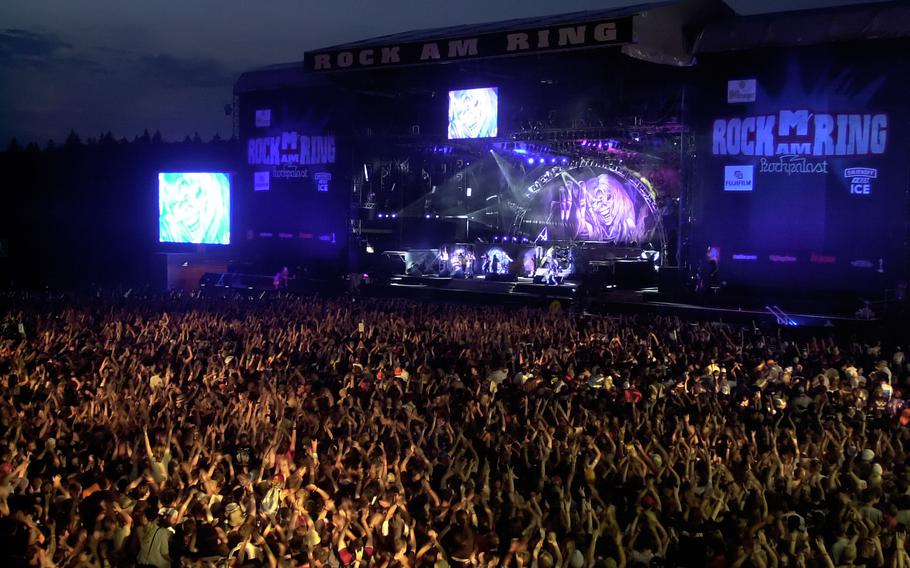
Germany’s massive annual rock festival Rock am Ring in Nurburgring, June 3, 2003. (Raymond T. Conway/Stars and Stripes)
This article first appeared in the Stars and Stripes Europe edition, June 20, 1986. It is republished unedited in its original form. The accompanying photos are from festivals from the early 2000s.
It was billed the Grand Prix of Rock, but if came one year too soon.
Eighteen bands performing more than 25 hours of music failed to draw a capacity crowd to Germany’s Nurburgring race track last weekend for the two-day Rock am Ring festival.
With a lineup dominated by relatively new British bands — chart toppers in the United Kingdom but virtual unknowns in Germany — attendance at the festival fell several thousand short of what promoters had hoped for.
Last year’s Rock am Ring, which featured such acts as Foreigner, Saga, REO Speedwagon, Huey Lewis & the News and Rick Springfield drew an estimated 70,000 fans to the race track. This year promoters hoped for 50,000.
Still, some 42,600 people turned out from throughout Germany and surrounding countries — despite the threat of rain and the World Cup soccer championship on European television — for performances by headliners such as Simple Minds and James Taylor and such acts as Simply Red, the Waterboys, Feargal Sharkey and others.
A simultaneous festival in Munich, featuring the same bands performing on alternate days, drew about 11,500 fans.
“We can’t expect to put together a program each year that is as popular as last year’s,” said Marek Lieberberg of Mama Concerts in Frankfurt, organizer of the Rock am Ring festivals. “We feel the progams this year was musically excellent ... it was maybe just one year too soon for Germany.”
Lieberberg also cited as a reason for the comeratively low attendance the lack of top American acts in the festival lineip. This, in turn, accounted for a small number of Americans in the audience. No more than an estimated few hundred attended this year’s show, compared to 20,000 — 25,000 Americans among the audience last year.
Fear of terrorism and radiation led some American acts to cancel their appearance; other preferred to remain at home. (Promoters had been negotiating with ZZ Top and Stevie Wonder, among others.)
The Bangles, the all-female band from Los Angeles, was one of the few American acts that appeared, along with Taylor and L.A.’s Cock Robin.
“We like to be brave and adventurous ... and we owe it to the people here to play here, too,” said guitarist Susanna Hoffs in a press conference shortly after the group’s performance.
Added guitarist Vicki Peterson “We did some studying, and we realized that nobody had any concrete evidence to support the fear (of radiation).
“As for terrorism we figure we drive on L.A. freeways every day, and the threat there is so much higher than getting on a plane with a bomb.”
Reactions to the festival were mixed, but most of the crowd appeared to enjoy the weekend.
“The music isn’t necessarily the most important thing at a festival like this. It’s the feeling that counts,” said one young German who was relaxing several hundred yards away from the stage.
Blue skies, sunshine and temperatures in the 70s added to the pleasant ambience at the racecourse in Germany’s volcanic Eifel region. Many of the spectators, clad in various stages of dress (and undress) — shorts and T-shirts, cut-offs and bikinis — worked on their tans, tossed Frisbees or napped in the sun, with the music playing in the background.
No major incidents occurred, according to police and Red Cross officials. The crowd remained disciplined throughout the weekend, and fans shared Bratwurst, pizza, beer and other items available at the many booths.
Nighttime, when bands stopped performing was more difficult to bear said the young German. Like many others, he had been camping at the nearby campground since the day before the festival.
“The music goes on until 5 am in the morning with people blasting their car stereos,” he said.
For another German music fan Andreas Rosenhammer of Oehringen the absence of Americans at the festival was a disappointment.
“Germans tend to be more reserved. They need somebody to get them going,” he added, sweeping his hand over the then-passive crowd.
But it was still only early afternoon on the first day of the festival. The crowd would have enough time to get warmed up.
“Americans are more natural, they dance and go crazy,” he said.